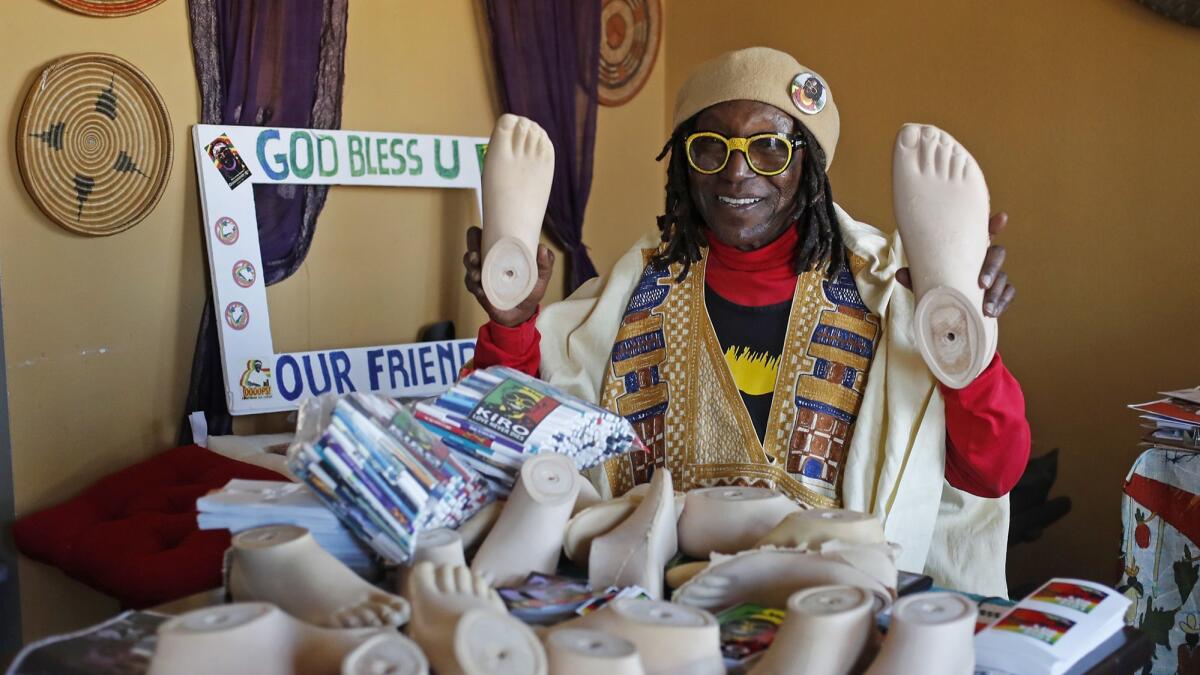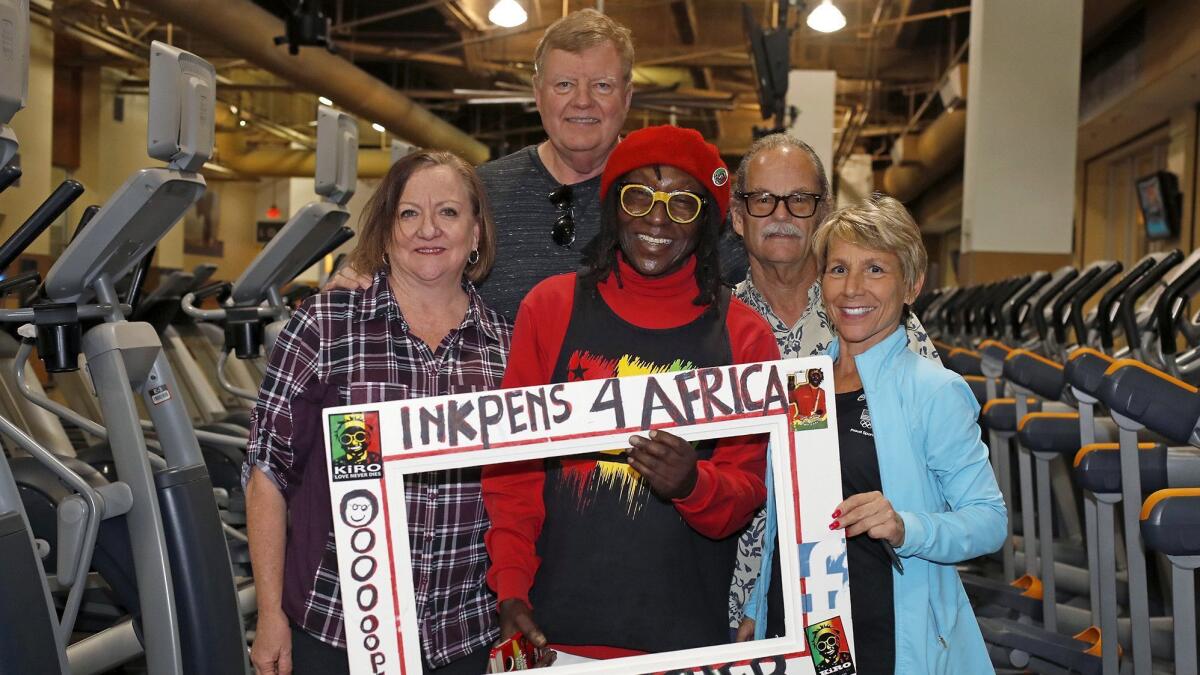O.C. music icon Kiro escaped Rawandan genocide but returns to Africa to provide charitable aid

- Share via
In the days following the end of the Rwandan genocide, the country was still simmering from the chaos as Bigiria Mustapha Prince David Willy Kirokiro aimlessly walked the streets of his former home.
He managed to escape the violence, though it claimed more than 50 of his friends and family, all part of the Tutsi ethnic group. His son and girlfriend were among the dead.
“She died the first day,” said the man commonly known as Kiro. “I was going to marry her. They killed her and my son with a machete. They killed her whole family.”
He thought of the dead as he walked among the old places he used to frequent before the violence. They were different.
When he came across a group of homeless boys digging through trash, he ached for them.
“Meet me at this spot in three days,” he told them.
When he came back with food for the emaciated boys, they devised among themselves a plan to snatch his bag and run.
“They didn’t realize I speak Rwandese,” Kiro said.
He broke into the conversation with the local tongue. The boys realized they’d made a mistake.
“I said, ‘C’mon, you guys,’ and they said, ‘Awwwwww,’ ” Kiro said.
Kiro fed the boys and housed them in his friends’ and family’s homes. Strangers before the genocide, Kiro keeps in touch with them today as though they were his own children.
“They are men now — married and working,” Kiro said with a big smile during an interview in his Costa Mesa home.
Kiro was born in Burundi. He remembers a lot, but his age eludes him. He thinks he’s about 70.
“It doesn’t matter. I don’t even remember my birthday,” Kiro said, laughing.
With 17 siblings from his father and five mothers, Kiro had to be resourceful as a child. He’d walk 25 miles through the jungle to get to school. If it got too dark to walk any longer, he’d knock on a stranger’s door to stay the night.
“They would wake you up in the morning and feed you,” Kiro said.
Living in Burundi, Congo and Rwanda, Kiro became known for his tam-tam shops, which sold souvenir items. When his father died, he stepped up as the patriarch, financially supporting his siblings and his own children.
Then the violence came.
Spurred by the Hutu ethnic group, between 500,000 and 1 million Rwandans were killed between April and July of 1994.
Coming to the United States under political asylum with only $20, Kiro relied on the kindness of friends he had met through his stores. He lived in Washington, D.C. and New York City, setting up on street corners to sell counterfeit VHS tapes.
He moved to Costa Mesa in the mid-1990s and began selling at the the OC Fair & Event Center’s regular swap meet.
Kiro sold African items and became a kind of curiosity for people.
“People would ask, ‘Do you eat monkey?’ — I would say, ‘Yep,’ to whatever they want to hear,” Kiro said, laughing. “They say, ‘Let’s go see this guy who eats monkeys.’ Then they buy my items.”
His success led him to open a storefront, African Corner, which closed about three years ago when Kiro retired.
“I never worked for somebody. I always worked for myself,” Kiro said. “That’s why I am still alive.”
Kiro started playing drums at the fairgrounds and eventually started holding drum circles throughout the county. Many attended, including a clothing designer who felt that Kiro’s face would look good on a shirt.
The image he came up with, of Kiro’s unfurled dreadlocks, characteristic yellow glasses and big smile, became iconic in the Orange County music scene.
His face adorns stickers, shirts and buttons. If you live in Orange County and venture outside, you’ve likely seen Kiro’s face.
Some of the apparel carries the quote “oooops!” a catchphrase Kiro came up with after repeatedly dropping his items at the swap meet.
“Kiro’s image is iconic in Orange County, almost like the famous Bob Marley picture,” said Brandon Hargraves, frontman of the Newport Beach band Low Budget. “You’ll see his stickers in every O.C. venue, and everybody wears his shirts. I wear his shirts.
“Kiro is known in the scene for his kindness. He does whatever he can to help bands out and support them.”
Music has always been a passion for Kiro. Drums in particular hold a kind of spiritual significance to him because they mirror the rhythm by which people live.
“Drumming is your heartbeat,” Kiro said. “It’s how you walk — boom, boom. Everybody has a rhythm.”
Costa Mesa resident Jerry King met Kiro about eight years ago. He’s been taking part in the drum circles.
“Kiro makes a real impact,” said King. “He’s a wonderful human being. There’s something in him that people intuitively recognize.”
King said when he walks down the street with Kiro, people regularly shout, “Kiro!” or “ooooops!” like a rallying cry.

Kiro has used his financial successes to fund the work he really cares about: returning charity to his homeland. His apartment is a testament to this.
Boxes of beads sit underneath a bench in his living room. He will bring them back to Africa on his next trip for the widows in the community who don’t have a means to make a living.
“Those two tons of beads I am taking to Africa will empower the women there,” he said. “The widows — they can make jewelry and sell it.”
Bags of markers, which will be given to students, are splayed out on the floor. Hundreds of prosthetic feet pack a suitcase. Kiro regularly brings these home for the handicapped.
A small bucket sitting on a chair was used to raise money for two schools Kiro started in Africa. He remodeled a third.
“After the genocide I decided to do something for my country,” Kiro said. “This happened because of lack of education. If we are educated, you can’t kill somebody with a machete.”
Kiro travels back to Africa several times a year with his charitable items and visits the two schools he started. He’s usually met by swarms of children sporting shirts and buttons with his face on them. The students who attend his schools are called Kiro’s Kids.
“I love to do this work,” Kiro said. “I am never alone in Africa.”
All the latest on Orange County from Orange County.
Get our free TimesOC newsletter.
You may occasionally receive promotional content from the Daily Pilot.








